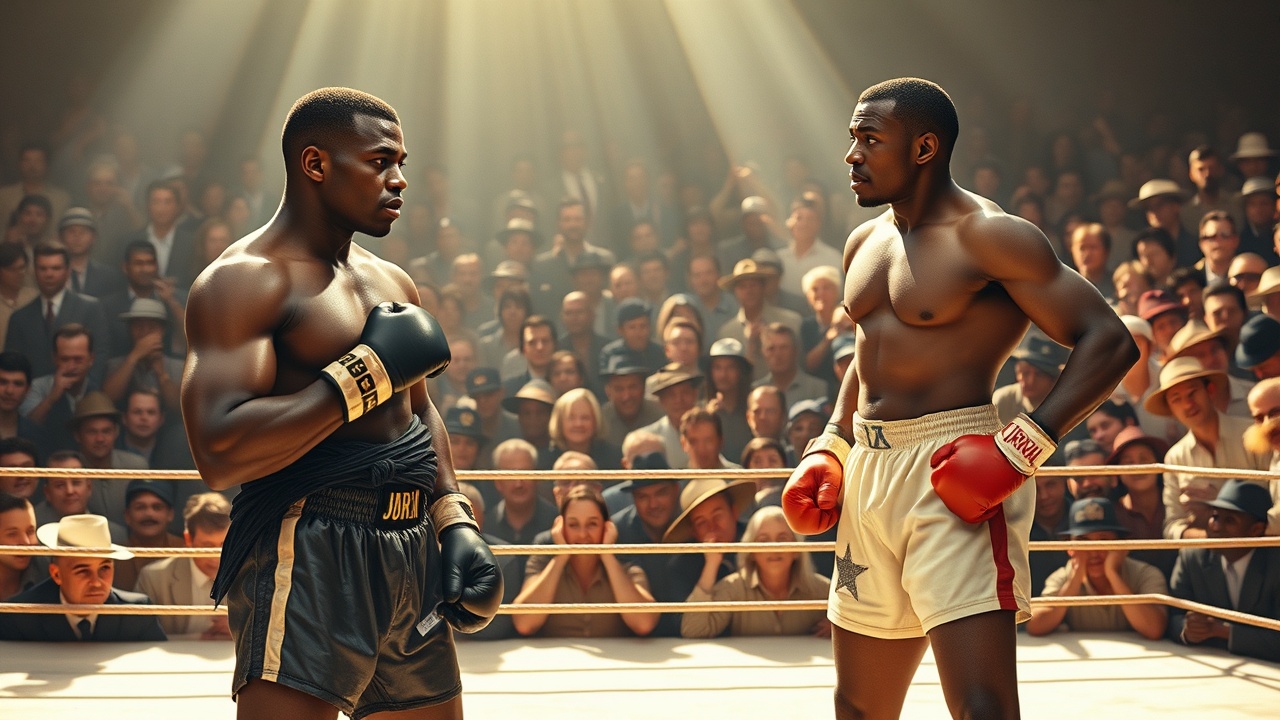The Fight of the Century
On July 4, 1910, a boxing match unfolded that would be etched into American history as more than just a contest for the heavyweight championship; it became a significant cultural event. Dubbed “The Fight of the Century,” the bout between Jack Johnson and Jim Jeffries drew unprecedented attention, leading to the construction of a makeshift stadium in Reno, Nevada, specifically for the occasion. The hastily erected venue, still emitting sticky pitch in the sweltering sun, showcased a spectacle that captured a nation’s imagination.
Anticipation and Engagement
As the fight day approached, anticipation grew wildly across the United States. In New York’s Times Square, crowds congregated in front of bulletin boards, anxiously awaiting each round’s updates. Meanwhile, a San Francisco newspaper took engagement a step further by hiring two boxers to reenact the fight in a ring, all while telegraph updates flowed in from Reno. The urgency of the moment was so intense that a tanker ship on the Atlantic, concerned about the fight’s outcome, signaled an urgent inquiry to a passenger vessel:
“Who won?”
Jack London, the revered American author, was among those who felt nervously invested in the event. In a letter, he expressed a keen desire to witness the bout, stating that the mere thought of it being canceled due to an unforeseen disaster filled him with dread.
“I want to see that fight so bad that it hurts,”
he wrote, illuminating the deep emotional connection that many fans had with the contest.
Aftermath and Racial Unrest
Yet, the fight’s conclusion marked the start of some of the most severe racial unrest in the United States since the Civil War. The outcome ignited fierce riots across the country, with the New York Tribune reporting that violence erupted “like prickly heat” nationwide. As news spread that Johnson had defeated Jeffries, white mobs retaliated with brutality against African American communities. In New Orleans, young Louis Armstrong recalled being warned to run for his life as violence erupted around him. The sentiment among the white populace was one of outrage following a loss that challenged their racial hierarchy.
Jack Johnson’s Legacy
Jack Johnson, born in Galveston, Texas, to former slaves, had become a polarizing figure long before stepping into the ring against Jeffries. Dominating the heavyweight division during an era of severe racial discrimination, Johnson had fought relentlessly to secure his place as champion, ultimately defeating Tommy Burns to claim the title. The circumstances surrounding Johnson’s rise to fame were complicated; he became a symbol of both triumph and controversy, openly challenging the status quo by both his actions and lifestyle.
Jeffries, known as an imposing figure and an unbeatable athlete during his prime, had solidified his status as champion before retiring undefeated. His return from retirement to face Johnson was framed not only as a boxing match but also as a matter of racial pride for many white Americans, eager to see their champion restore the norm of a white heavyweight titleholder. The fight’s promoters, aware of the national fervor, risked everything to relocate the event to Reno after California officials attempted to halt it.
The bout itself, however, proved far from the titanic struggle many anticipated. Johnson exhibited superior skills, easily dismantling Jeffries over the rounds and ultimately winning by knockout in the 15th round. The fight’s atmosphere was rife with tension, with spectators chanting that the result would be unacceptable. Johnson’s triumph was characterized by a combination of technical brilliance and a psychological edge over Jeffries, further illustrating the systemic racial tensions that loomed over them.
Consequences and Reflection
As Johnson celebrated, the nation grappled with the chaos precipitated by his victory. In the wake of the fight, violence spread, particularly towards Black communities who reveled in Johnson’s win. Despite the celebratory nature within some circles, the aftermath of the fight caused devastating repercussions for many.
In the following years, Johnson faced severe backlash from authorities who sought to undermine his public persona, culminating in his arrest under the Mann Act, primarily used to combat human trafficking, though it had never been applied to consensual relationships before. The charges were widely seen as politically motivated, targeting Johnson for both his skin color and lifestyle choices.
Johnson spent years evading the law, continuing to fight and perform internationally until returning to face further challenges in his homeland. The fallout from his match against Jeffries profoundly impacted not only his career but also the delicate racial dynamics of early 20th-century America, setting a tone of racial tension that highlights both the achievements and pitfalls of that era.
Conclusion
Today marks 115 years since that fateful bout, a pivotal moment that revealed the deep scars of racism while also showcasing the unwavering human spirit in the face of monumental challenges. Johnson’s legacy was built not just on his prowess in the ring but on the powerful societal questions his life and victories continued to raise long after the final bell.




